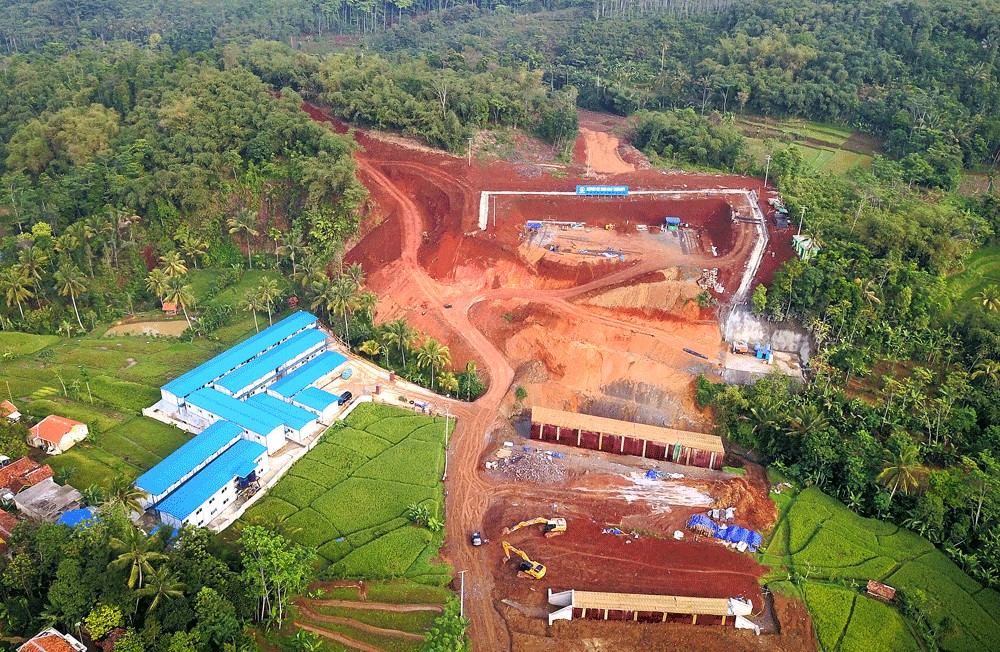Popular Reads
Top Results
Can't find what you're looking for?
View all search resultsPopular Reads
Top Results
Can't find what you're looking for?
View all search resultsRenegotiating train deal
President Joko “Jokowi” Widodo said last week the railway would only enter operation by the end of June 2023, or four years later than the original schedule.
Change text size
Gift Premium Articles
to Anyone
 Pushed to limit: Work continues at Cipeundeuy, West Java on the construction of the Jakarta-Bandung high-speed rail network on Nov. 21, 2018. PT Kereta Cepat Indonesia China (KCIC) had expected to complete the 142-kilometer project in 2021 but is now saying the train will be running by June 2023. (Antara/Raisan Al Farisi)
Pushed to limit: Work continues at Cipeundeuy, West Java on the construction of the Jakarta-Bandung high-speed rail network on Nov. 21, 2018. PT Kereta Cepat Indonesia China (KCIC) had expected to complete the 142-kilometer project in 2021 but is now saying the train will be running by June 2023. (Antara/Raisan Al Farisi)
T
here is growing concern among the public that the Jakarta-Bandung high-speed train project will plunge Indonesia into a “debt trap”, although there are barely indications to prove the fear. But one thing is sure, the longer the project the more costly the mega friendship cooperation and the more questionable the prospect of the dream train.
According to the deal signed by Indonesia and China as the basis of the megaproject, the host will bear a much heavier burden compared with its partner in realizing the construction of the railway.
The construction has met yet another setback caused by geographical and geological obstacles. President Joko “Jokowi” Widodo said last week the railway would only enter operation by the end of June 2023, or four years later than the original schedule.
Last year, the President was confident in suggesting the railway project would be completed before Indonesia hosted the Group of 20 (G20) summit in October of this year. Back then, he said he would take the train from Jakarta to Bandung with President Xi Jinping.
The project has now been postponed twice since the government awarded it to China in September 2015, to the shock of Japan, which had completed a thorough feasibility study and was offering a very generous loan scheme for the 142.3-kilometer railway construction. The project started on Jan. 21, 2016, practically without a comprehensive feasibility study, causing Indonesia to pay the price dearly later.
According to the original plan, the project would not burden the state budget, thanks to its business-to-business financing scheme. It was a stark contrast to Japan’s proposal, which demanded a government guarantee. Last year, however, the government had to change the formula of the contract and, hence, carry the financial burden.
Indonesia and China formed a consortium, Kereta Cepat Indonesia China (KCIC), to execute the construction. Indonesia controls 60 percent of the shares while the rest is owned by China.
State construction firm PT Wijaya Karya leads the Indonesian consortium with 38 percent shares, with state train operator PT KAI and state plantation company PT Perkebunan Nusantara VIII each owning 25 percent of the shares, while the remaining 12 percent going to state toll road operator PT Jasa Marga.
Perhaps Indonesia had never anticipated the worst-case scenario when approving the contract, which stipulates that in the case of any cost overrun, the loss will be divided among the shareholders according to the composition of their shares. With a 23 percent cost overrun, the cost of the project now totals US$8 billion from $6.07 billion in original value, and is very likely to soar following the second delay, at the great expense of Indonesia.
Such a formula, and the financial burden Indonesia has to shoulder, does not make sense and is unfair for many because Indonesia is the party that awarded the contract.
To solve the conundrum, President Jokowi should personally approach President Xi to open the possibility for a contract renegotiation.
The railway project is a symbol of friendship between the two countries. The sincerity of both sides to find a mutually beneficial, fair and comprehensive solution is crucial in order to keep the project on track.
There should be no more delay to the railway construction, which is supposed to be a landmark in the bilateral relationship between Indonesia and China. Both President Jokowi and President Xi can come to the rescue.
Further delay, on the other hand, will result in public skepticism of the two countries’ commitment to a close, sustainable bilateral relationship.










